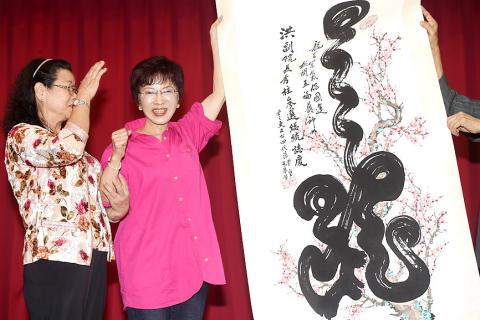Chinese Nationalist Party (KMT) presidential candidate Hung Hsiu-chu (洪秀柱) yesterday likened the struggle of her campaign to gain momentum to Republic of China (ROC) founding father Sun Yat-sen’s (孫逸仙) initial failures to overthrow the Qing Dynasty.
According to a poll conducted by Taiwan Indicators Survey Research (TISR) and released on Friday, Hung’s support has dropped to 12.7 percent, a decline from the 15 percent backing she received in a poll released by the Cross-strait Policy Association on Wednesday.
Of those surveyed, 37.3 percent in the Taiwan Indicators poll said they would vote for Democratic Progressive Party presidential candidate Tsai Ing-wen (蔡英文), while People First Party (PFP) presidential candidate James Soong (宋楚瑜) garnered 19.1 percent.

Photo: Liao Chen-huei, Taipei Times
Asked about rumors that some within the KMT’s own ranks oppose her candidacy and have asked her to withdraw if her numbers do not improve — with KMT Taipei City Councilor Lee Hsin (李新) proposing a head-to-head vote be conducted between Hung and Soong — Hung cited Sun as an example to demonstrate her resolve.
“Do you know how many times Sun launched insurrections against the Qing Dynasty before he finally succeeded? How could the ROC have been established if he had given up after just a single failure?” she said.
When asked about the possibility of a team-up between the KMT and the PFP, Hung said on Friday night it is “not possible” and reiterated yesterday that she is the candidate endorsed by the KMT’s national congress.
Hung also explained what she meant when she said in an interview on Friday night that she would like “more attention from [Legislative Speaker] Wang Jin-pyng (王金平) and [Vice President] Wu Den-yih (吳敦義),” denying she was suggesting the two are reluctant to help.
“It is just a call for party solidarity. People have the feeling that that the campaign is picking up momentum, but we just hope that the effort can speed up more,” she said.

Tropical Storm Gaemi strengthened into a typhoon at 2pm yesterday, and could make landfall in Yilan County tomorrow, the Central Weather Administration (CWA) said yesterday. The agency was scheduled to issue a sea warning at 11:30pm yesterday, and could issue a land warning later today. Gaemi was moving north-northwest at 4kph, carrying maximum sustained winds near its center of up to 118.8kph and gusts of 154.8kph. The circumference is forecast to reach eastern Taiwan tomorrow morning, with the center making landfall in Yilan County later that night before departing from the north coast, CWA weather forecaster Kuan Shin-ping (官欣平) said yesterday. Uncertainty remains and

SEA WARNING LIKELY: The storm, named Gaemi, could become a moderate typhoon on Wednesday or Thursday, with the Taipei City Government preparing for flooding A tropical depression east of the Philippines developed into a tropical storm named Gaemi at 2pm yesterday, and was moving toward eastern Taiwan, the Central Weather Administration (CWA) said. Gaemi could begin to affect Taiwan proper on Tuesday, lasting until Friday, and could develop into a moderate typhoon on Wednesday or Thursday, it said. A sea warning for Gaemi could be issued as early as Tuesday morning, it added. Gaemi, the third tropical storm in the Pacific Ocean this typhoon season, is projected to begin moving northwest today, and be closest to Taiwan on Wednesday or Thursday, the agency said. Today, there would likely

DISRUPTIONS: The high-speed rail is to operate as normal, while several airlines either canceled flights or announced early departures or late arrivals Schools and offices in 15 cities and counties are to be closed today due to Typhoon Gaemi, local governments announced last night. The 15 are: Taipei, New Taipei City, Taoyuan, Tainan, Keelung, Hsinchu and Kaohsiung, as well as Yilan, Hualien, Hsinchu, Miaoli, Chiayi, Pingtung, Penghu and Lienchiang counties. People should brace for torrential rainfall brought by the storm, with its center forecast to make landfall on the east coast between tonight and tomorrow morning, the Central Weather Administration (CWA) said. The agency issued a sea warning for the typhoon at 11:30pm on Monday, followed by a land warning at 11:30am yesterday. As of

CASUALTY: A 70-year-old woman was killed by a falling tree in Kaohsiung as the premier warned all government agencies to remain on high alert for the next 24 hours Schools and offices nationwide are to be closed for a second day today as Typhoon Gaemi crosses over the nation, bringing torrential rain and whipping winds. Gaemi was forecast to make landfall late last night. From Tuesday night, its outer band brought substantial rainfall and strong winds to the nation. As of 6:15pm last night, the typhoon’s center was 20km southeast of Hualien County, Central Weather Administration (CWA) data showed. It was moving at 19kph and had a radius of 250km. As of 3pm yesterday, one woman had died, while 58 people were injured, the Central Emergency Operation Center said. The 70-year-old